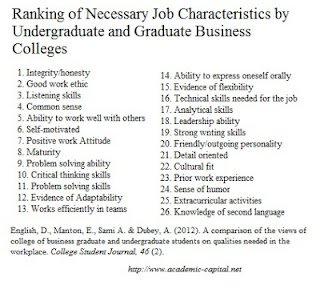English is the language of business and
offers unique advantages for international commerce and business education. As
a communication medium, the ability to share ideas and conduct transactions
across multiple continents helps speed up trade and idea sharing that often
leads to wealth generation. The building of international relevance in the
business world is fostered by connecting people and their ideas.
Consider the purpose of communication and its
impact on the transference of information. When two people share similarities
of a language, they need fewer feedback loops to understanding the
conversation. Using the same language lowers the time it takes to propose and
clarify propositions within daily interactions. This process of knowledge
sharing speeds up exponentially and can increase the profitability that people
will enhance knowledge.
American companies have an advantage because
of the commonality English as a business language (Cavaliere, Glasscock, &
Sen, 2014). The more English is used around the world, and the more likely the
U.S will be advantaged from present and future business contracts.
International commerce becomes more plausible when two companies can
communicate and integrate easily. A similarity of language can create
similarity of thought and purpose.
Language is embedded with codes, symbols,
patterns of thinking and values. When a particular language is spoken in
different cultures and locations, the people’s culture will begin to align with
the values of that language. The more the people speak a particular language,
the more they are going to find similarities with others who speak that
language.
In the education arena, opportunities for
employment in English speaking companies support English education. English as a business language ensures that
the majority of the great ideas and opportunities are supported by using the
mental framework set out by the semantic structure of the language itself.
Language changes the way we think and understand problems.
Using English as an international business
language also helps in educating and employing individuals with American businesses.
Graduating students will associate opportunity and education with English
speaking companies. The eventual result is the attraction of talent to an
opportunity like a magnet is attracted to metal objects.
The way we think is related to the way we talk
and use words. Speaking in a particular language activates various centers in
our brains and becomes part of our memories and thought processes. Using
English as a business language helps people to understand the same perspectives
and values that made America an economic powerhouse. Ease of communication
speeds up the transference of knowledge, ideas and collaboration with other
entities and countries. The commonality of language can encourage higher
business theory development and marketing effectiveness.
Cavaliere, F., Glasscock, K. & Sen, K.
(2014). The englishization of business: does this help or hinder teaching
global business? Education, 135 (2).
